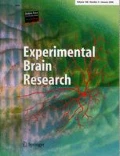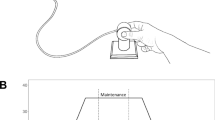Abstract
Declines in manual dexterity are frequently quantified as the time it takes to complete the grooved pegboard test. The test requires individuals to manipulate 25 pegs, one at a time, by removing them from a well and inserting them into a prescribed hole. The manipulation of each peg involves four phases: selection, transport, insertion, and return. The purpose of our study was to compare the times to complete the four phases of peg manipulation and the forces applied to the pegboard during peg insertion as young, middle-aged, and old adults performed the grooved pegboard test. The relative significance of the peg-manipulation attributes for 30 young (24.0 ± 4.4 years), 15 middle-aged (46.5 ± 6.5 years), and 15 old (70.4 ± 4.0 years) adults was assessed with a multiple-regression analysis. The grooved pegboard test was performed on a force plate. Pegboard times for the old adults (81 ± 17 s) were longer than those for young (56 ± 7 s) and middle-aged (58 ± 11 s) adults. Regression analysis indicated that the explanatory variables for the pegboard times of young (R2 = 0.33) and middle-aged (R2 = 0.78) adults were the times for the peg insertion and return phases, whereas the predictors for old adults (R2 = 0.49) were the times for the peg selection and transport phases. The relative influence of peg-manipulation capabilities on a pegboard test of manual dexterity was greater for middle-aged adults than for young and old adults.


Similar content being viewed by others
References
Almuklass AM, Price RC, Gould JR, Enoka RM (2016) Force steadiness as a predictor of time to complete a pegboard test of dexterity in young men and women. J Appl Physiol 120:1410–1417. https://doi.org/10.1152/japplphysiol.01051.2015
Almuklass AM, Feeney DF, Mani D, Hamilton LD, Enoka RM (2017) Peg-manipulation capabilities during a test of manual dexterity differ for persons with multiple sclerosis and healthy individuals. Exp Brain Res 235:3487–3493. https://doi.org/10.1007/s00221-017-5075-4
Ashendorf L, Vanderslice-Barr JL, McCaffrey RJ (2009) Motor tests and cognition in healthy older adults. Appl Neuropsychol 16:171–176. https://doi.org/10.1080/09084280903098562
Bellumori M, Uygur M, Knight CA (2016) High-speed cycling intervention improves rate-dependent mobility in older adults. Med Sci Sports Exerc 40:106–114. https://doi.org/10.11249/MSS.0000000000001069
Bowden JL, McNulty PA (2010) Age-related changes in cutaneous sensation in the healthy human hand. Age (Dordr) 35:1077–1089. https://doi.org/10.1007/s11357-012-9429-3
Bowden JL, McNulty PA (2013) The magnitude and rate of reduction in strength, dexterity and sensation in the human hand vary with ageing. Exp Gerontol 48:756–765. https://doi.org/10.1016/j.exger.2013.03.011
Brogårdh C, Johansson FW, Nygren F, Sjölund BH (2010) Mode of hand training determines cortical reorganisation: a randomized controlled study in healthy adults. J Rehabil Med 42:789–794. https://doi.org/10.2340/16501977-0588
Bronson-Lowe CR, Loucks TM, Ofori E, Sosnoff JJ (2013) Aging effects on sensorimotor integration: a comparison of effector systems and feedback modalities. J Motor Behav 45:217–230. https://doi.org/10.1080/00222895.2013.784239
Bryden P, Roy E (2005) A new method of administering the Grooved Pegboard Test: performance as a function of handedness and sex. Brain Cogn 58:258–268. https://doi.org/10.1016/j.bandc.2004.12.004
Chambliss C, Tyson K, Tracy J (1996) Performance on the Purdue pegboard and finger tapping by schizophrenics after mellow and frenetic antecedent music. Percept Mot Skills 83:1161–1162. https://doi.org/10.2466/pms.1996.83.3f.1161
Cole KJ, Rotella DL, Harper JG (1998) Tactile impairments cannot explain the effect of age on a grasp and lift task. Exp Brain Res 121:263–269. https://doi.org/10.1007/s002210050459
Cook RD (1977) Detection of influential observation in linear regression. Technometrics 19:15–18
Desrosiers J, Hébert R, Bravo G, Dutil E (1996) Hand sensibility of healthy older people. J Am Geriatr Soc 44:974–978
Gershon RC, Cella D, Fox NA, Havlik RJ, Hendrie HC, Wagster MV (2010) Assessment of neurological and behavioural function: the NIH toolbox. Lancet Neurol 9:138–139. https://doi.org/10.1016/S1474-4422(09)70335-7
Hamilton LD, Thomas E, Almuklass AM, Enoka RM (2017) A framework for identifying adaptations responsible for differences in pegboard times between middle-aged and old adults. Exp Gerontol 97:9–16. https://doi.org/10.1016/j.exger.2017.07.003
Kalron A, Greenberg-Abrahami M, Gelav S, Achiron A (2013) Effects of a new sensory re-education on hand sensibility and manual dexterity in people with multiple sclerosis. NeuroRehabil 32:943–948. https://doi.org/10.3233/NRE-130917
Lawrence E, Dayanidhi S, Fassola I, Requejo P, Leclerq C, Winstein CJ, Valero-Cuevas FJ (2015) Outcome measures for hand function naturally reveal three latent domains in older adults: strength, coordinated upper extremity function, and sensorimotor processing. Front Neurosci 7:108. https://doi.org/10.3389/fnagi.2015.000108
Lin YH, Hsieh SC, Chao CC, Chang YC, Hseih ST (2005) Influence of aging on thermal and vibratory thresholds of quantitative sensory testing. J Peripher Nerv Syst 10:269–281. https://doi.org/10.1111/j.1085-9489.2005.10305.x
Marmon AR, Pascoe MA, Schwartz RS, Enoka RM (2011) Associations among strength, steadiness, and hand function across the adult life span. Med Sci Sports Exerc 43:560–567. https://doi.org/10.1249/MSS.0b013e3181f3f3ab
Martin JA, Ramsay J, Hughes C, Peters DM, Edwards MG (2015) Age and grip strength predict hand dexterity in adults. PLoS One. https://doi.org/10.1371/journal.pone.0117598
McIsaac TL, Fuglevand AJ (2006) Influence of tactile afferents on the coordination of muscles during a simulated precision grip. Exp Brain Res 174:769–774. https://doi.org/10.1007/s00221-006-0643-z
Michimata A, Kondo T, Suzukamo Y, Chiba M, Izumi SI (2008) The manual function test: norms tor 20- to 90-year-olds and effects of age, gender, and hand dominance on dexterity. Tohoku J Exp Med 214:257–267
Midorikawa A, Hashimoto R, Noguchi H, Saitoh O, Kunugi H, Nakamura K (2008) Impairment of motor dexterity in schizophrenia assessed by a novel finger movement test. Psychiat Res 159:281–289. https://doi.org/10.1016/j.psychres.2007.04.004
Müller T, Schäfer S, Kuhn W, Przuntek H (2000) Correlation between tapping and inserting of pegs in Parkinson’s disease. Can J Neurol Sci 27:311–315
Olafsdottir HB, Zatsiorsky VM, Latash ML (2008) The effects of strength training on finger strength and hand dexterity in healthy individuals. J Appl Physiol 105:1166–1178. https://doi.org/10.1152/japplphysiol.00054.2008
Ostwald SK, Snowdon DA, Rysavy SDM, Keenan NL, Kane RL (1989) Manual dexterity as a correlate of dependency in the elderly. J Am Geriatr Soc 37:963–969
Proud EL, Morris ME (2011) Skilled hand dexterity in Parkinson’s disease: effects of adding a concurrent task. Arch Phys Med Rehabil 92:2098. https://doi.org/10.1016/j.apmr.2010.01.008
Ruff RM, Parker SB (1993) Gender- and age-specific changes in motor speed and eye-hand coordination in adults: normative values for the finger tapping and grooved pegboard tests. Percept Mot Skills 76:1219–1230. https://doi.org/10.2466/pms.1993.76.3c.1219
Schmidt SL, Oliveira RM, Rocha FR, Abreu-Villaça Y (2000) Influences of handedness and gender on the grooved pegboard test. Brain Cogn 44:445–454. https://doi.org/10.1006/brcg.1999.1204
Seema S, Martina AT (2015) Effects of hand arm bimanual intensive therapy on upper extremity skills and fine finger dexterity among hemiparetic cerebral palsy children. Int J Appl Res 1:296–298
Seidel D, Crilly N, Matthews FE, Jagger C, Brayne D, Clarkson PJ, Medial Research Council Cognitive Function and Ageing Study (2009) Patterns of functional loss among older people: a prospective study. Hum Factors 51:669–680. https://doi.org/10.1177/0018720809353597
Telles S, Singh N, Balkrishna A (2012) Finger dexterity and visual discrimination following two yoga breathing practices. Int J Yoga 5:37–41. https://doi.org/10.4103/0973-6131.91710
Thompson-Butel AG, Lin GG, Shiner CT, McNulty PA (2014) Two common tests of dexterity can stratify upper limb motor function after stroke. Neurorehabil Neural Repair 28:788–796. https://doi.org/10.1177/1545968314523678
Tremblay F, Wong K, Sanderson R, Coté L (2003) Tactile spatial acuity in elderly persons: assessment with grating domes and relationship with manual dexterity. Somatosens Mot Res 20:127–132. https://doi.org/10.1080/0899022031000105154
Veale JF (2014) Edinburgh handedness inventory—short form: a revised version based on confirmatory factor analysis. Laterality 19:164–177. https://doi.org/10.1080/1357650X.2013.783045
Venkatesan L, Barlow SM, Kieweg D (2015) Age- and sex-related changes in vibrotactile sensitivity of hand and face in neurotypical adults. Somatosens Mot Res 32:44–50. https://doi.org/10.1080/0899022031000105154
Vieluf S, Godde B, Reuter E-M, Voelcker-Rehage C (2013) Age-related differences in finger force control are characterized by reduced force production. Exp Brain Res 224:107–117. https://doi.org/10.1007/s00221-012-3292-4
Voelcker-Rehage C, Godde B (2010) High frequency sensory stimulation improves tactile but not motor performance in older adults. Mot Control 14:460–477. https://doi.org/10.1123/mcj.14.4.460
Wang Y-C, Magasi SR, Bohannon RW, Reuben DB, Mccreath HE, Bubela DJ, Gershon RC, Rymer WZ (2011) Assessing dexterity function: a comparison of two alternatives for the NIH toolbox. J Hand Ther 24:313–321. https://doi.org/10.1016/j.jht.2011.05.001
Williams MR, Hadler NM, Earp JL (1982) Manual ability as a marker of dependency in geriatric women. J Chron Dis 35:115–122
Yozbatıran N, Baskurt F, Baskurt Z, Ozakbas S, Idiman E (2006) Motor assessment of upper extremity function and its relation with fatigue, cognitive function and quality of life in multiple sclerosis patients. J Neurol Sci 246:117–122. https://doi.org/10.1016/j.jns.2006.02.018
Acknowledgements
A. M. Almuklass was supported by a scholarship from the King Saud bin Abdulaziz University for Health Sciences in Saudi Arabia.
Author information
Authors and Affiliations
Corresponding author
Ethics declarations
Conflict of interest
The authors declare no potential conflicts of interest.
Rights and permissions
About this article
Cite this article
Almuklass, A.M., Feeney, D.F., Mani, D. et al. Peg-manipulation capabilities of middle-aged adults have a greater influence on pegboard times than those of young and old adults. Exp Brain Res 236, 2165–2172 (2018). https://doi.org/10.1007/s00221-018-5294-3
Received:
Accepted:
Published:
Issue Date:
DOI: https://doi.org/10.1007/s00221-018-5294-3




